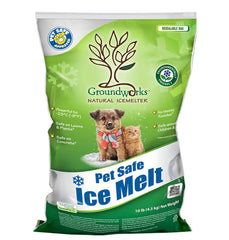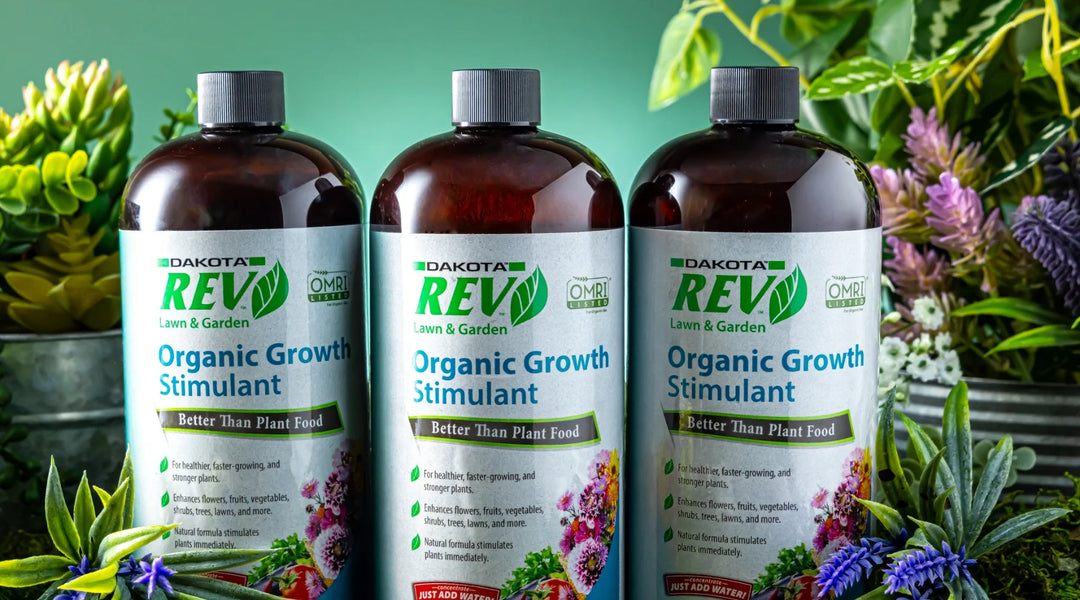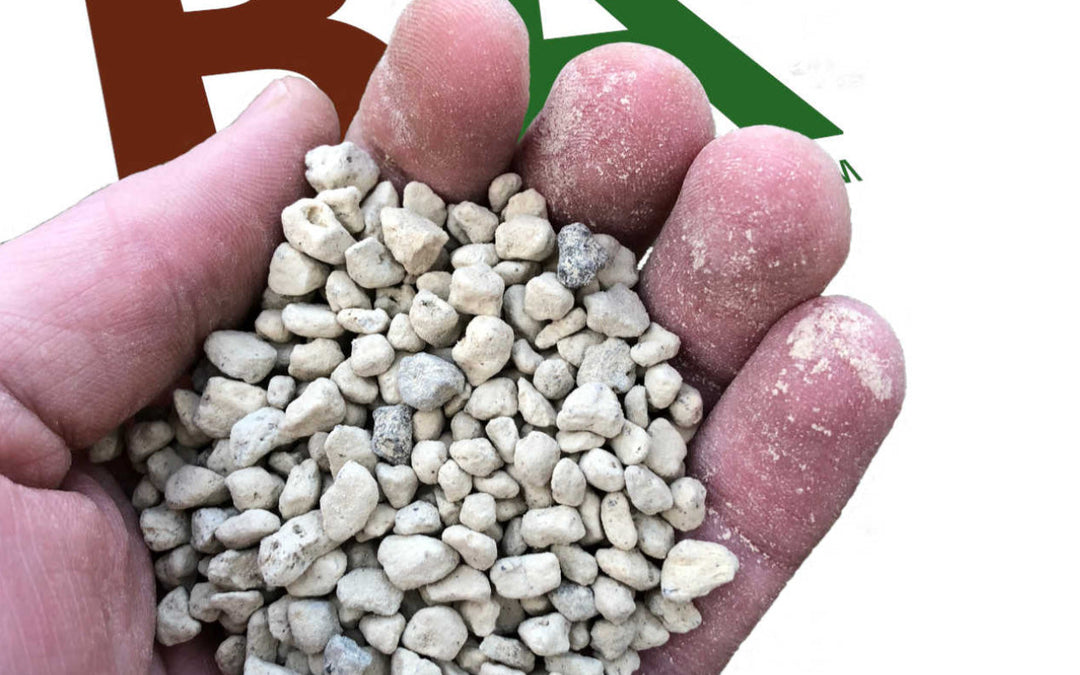5 Benefits of GroundWorks Natural Ice Melt
Winter weather can be tough on your sidewalks, driveways, lawns, and landscapes. Between the snow, ice, and cold temperatures, it's hard to keep things looking nice. Using a harsh chemical ice melt on your sidewalks and driveways can be just as damaging to your plants and lawns as the weather!
This fall and winter, you don't have to worry about pets or children getting hurt by harmful chemicals that are used as snow and ice melt products. Below we will discuss what GroundWorks Natural Ice Melt is and five benefits of using this all-natural, safe ice melt.
All About Ice Melt Products

There are many different types of ice melts available on the market today, so how do you know which one to choose?
The most important factor to consider when choosing an ice melt product is the temperature at which the product will work - you don't want to waste your money on an ice melting compound that won't work in the coldest temperatures! Another thing to consider is the surface you'll be using it on. Some ice melts are designed for concrete, while others work better on asphalt. Finally, think about any pets or children who may come into contact with the ice melt - you'll want to make sure it's safe for them.
Popular Ice Melt Products:
Rock salt is one of the most popular and affordable options for melting ice. It's effective at lower temperatures than some other products, but it can damage concrete, plants, people, and pets.
Magnesium chloride is another popular choice, as it's less damaging to concrete than rock salt. However, it can also be more expensive.
Calcium chloride is one of the most effective options for melting ice, but it can also be harmful to vegetation, people, and pets.
Potassium chloride is an option for those who are environmentally conscious, as it's less damaging to plants than calcium chloride or rock salt. However, it's not as effective at lower temperatures.
Urea is an organic compound that's sometimes used as an eco-friendly alternative to rock salt. However, it can be just as damaging to vegetation, people, and pets. The price of urea has drastically increased in the past few years, which makes it not the best option for melting ice any longer.
CMA (Calcium Magnesium Acetate) is another eco-friendly option that's less damaging to concrete and plants than rock salt or urea but is also a very expensive ice melt.
NAAC (Sodium Acetate) is a biodegradable deicer that's gentle on both concrete and vegetation. However, it has a relatively short shelf life and can be more expensive than other options.
Liquid glycol is an effective deicer, but it can be harmful to vegetation, pets, and children if ingested.
Keep these things in mind when choosing an ice melt for your property this winter! In the dead of winter, the last thing you want to worry about is your ice melt. As the snow begins to fly, you need an ice melt that will do the job quickly and efficiently.
A word of caution: some ice melts are simply variations of basic types blended with a non-ice melting additive for marketing reasons. Many products sold today are merely re-packaged commodities of rock salt that’s been naturally or artificially colored.
Why Should You Choose GroundWorks Natural Ice Melt?
GroundWorks Natural Ice Melt begins to work immediately and is rapid and powerful to -9°F (-23°C). It is the best ice melt for the job of keeping your property looking neat this winter. It is also cost-effective since you only need a small amount to cover a large area. Keep in mind that you will need to reapply the product before or after every snowfall.
What is GroundWorks Natural Ice Melt?
If you're looking for a safe, eco-friendly option for melting ice, look no further than Groundworks Natural Ice Melt. This product is the perfect choice for anyone who wants to effectively melt ice and snow and protect their yard and landscapes. This eco-friendly ice melt is made from potassium chloride, a nutrient that helps plants grow. Best of all, it's safe for pets and humans, so you don't have to worry about any harmful side effects or chemical burns to pet paws.
While salt has long been the go-to for melting ice, it can cause serious damage to the environment, sidewalks, and your driveway! As eco-conscious consumers become more aware of the harmful effects of salt, they are looking for more environmentally friendly options.
Keep your sidewalks and drives cleared all year with GroundWorks Natural Ice Melt, and do not worry about damaging your lawn and landscapes in the process! Also, with the residue-free formula, you will not track unwanted white oily residues into your home or business.
This Ice Melt is Available in 3 Sizes:
- 10-pound bags
- 22-pound bags
- 2 x 22-pound bags
How to Apply GroundWorks Natural Ice Melt
GroundWorks Natural Ice Melt is best applied in a uniform, even distribution and should be spread at a rate of 10 - 20 lbs. per 1,000 square feet (¼ - ½ cup per square yard). It is easiest to spread by mechanical means, such as a spreader, depending on the size of the coverage. Once the ice bond has broken, it is recommended to remove the ice and slush.
GroundWorks Natural Ice Melt may be applied at the beginning of a storm to prevent hard ice accumulations. So why wait? Give GroundWorks Natural Ice Melt a try today!
The Top 5 Benefits of Using GroundWorks Natural Ice Melt:
- Safe for pets and children
- Biodegradable and environmentally friendly
- Prevents ice and snow from building up
- Keeps your property looking great all winter long
- Reduces the need for salt
GroundWorks Natural Ice Melt is Safe for Use Around Pets and Children

Potassium chloride is not only an essential plant nutrient, but it is also eco-friendly and safe for both humans and pets. Unlike sodium products, potassium chloride helps to repair some of the damage that may be caused by rock salts or other salt-based ice melts. In addition, potassium chloride is very affordable, making it a great choice for those on a budget.
With so many benefits, it's no wonder that potassium chloride is one of the most popular agricultural fertilizers used by farmers worldwide. It's often used as a salt substitute for people who have cardiovascular disorders or for those who want to avoid sodium. And though it's not considered as tasty as its less-healthy counterpart, it's still a food additive in many things we (and our pets) eat daily, including:
- Cheese
- Margarine
- Ice-cream
- Breakfast cereals
- Sweeteners
- Soups and broths
- Beer
- Many processed/freeze-dried and canned foods
- Many popular pet foods
Potassium chloride is also an effective water softener that eliminates the calcium and magnesium in groundwater that cause soap scum and lime scale. In other words, potassium chloride is a very versatile and useful natural compound that we encounter quite frequently - so there's no need to worry about it being unsafe.
GroundWorks Natural Ice Melt is Biodegradable and Eco-Friendly
There's a lot to love about potassium chloride. It’s safe for crops, plants, soil, concrete, and water—it's even safe to eat! As the compound is naturally occurring and already present in most things, like water and soil, using it to melt ice does no harm to the environment. And when its job is done, it seamlessly melds back into the earth. (Note: as with anything, it is still important to read the label carefully and follow the directions for proper use.)
No wonder retailers are choosing GroundWorks Natural Ice Melt. Thanks to its unparalleled safety profile, potassium chloride is quickly becoming the choice for a variety of industries.
GroundWorks Natural Ice Melt Prevents Ice and Snow from Building Up on Sidewalks, Driveways, and Stairs
Winter brings the most unforgettable scenes: families playing in the snow, friends around the fireplace, and ski and snowboard trips. However, it also brings a rise in weather-related problems. Of these, ice and its removal are among the most critical.
Unfortunately, there is a small percentage of those who crack their ice dilemma only to face another problem when spring arrives: damaged concrete. But don’t worry; ice melt products can help!
3 Types of Concrete Damage Caused by Ice:
- Spalling: when flakes or chunks of concrete break off the surface
- Scaling: when the surface of the concrete becomes flaky or powdery
- Pitting: when small holes form in the surface of the concrete
The cause of this damage is the freeze/thaw cycle. When water freezes, it expands and puts pressure on the concrete. This can cause cracks which allow water to seep into the concrete, where it will freeze and thaw again, repeating the cycle and causing more damage each time.
The best way to repair this damage is to remove the damaged concrete and replace it with new concrete. To prevent this concrete damage from happening, you can use GroundWorks on your sidewalks and driveways.
How Do Ice Melt Products Work?

Have you ever wondered how those little pellets or granules that you sprinkle on your sidewalk or driveway work to melt the ice? It's simple chemistry! Ice melt works by lowering the freezing point of water. If you lower the freezing point of water below the outside temperature, the ice will melt. This process is called "dissolution."
A thin layer of brine (a saltwater solution) is formed over the ice as the ice melt begins to work. The ice melt dissolves into this liquid, and the brine continues to break down the layer of ice. This process is repeated until all the ice is melted. Not only is this method safe and effective, but it's also environmentally friendly!
How to Reduce the Risk of Concrete Damage
As any homeowner knows, damage to concrete can be a real pain. Not only is it unsightly, but it can also be expensive to repair. Fortunately, there are a few steps you can take to help reduce the risk of damage to your concrete:
First, remove slush and broken ice from the surface as soon as possible. This will help to prevent further damage from the freeze/thaw cycle.
Second, use good quality ice melt products like GroundWorks. This will help to prevent chemical damage caused by normal salt-based ice melts and extend the freeze/thaw cycle.
Third, try to prevent water build-up on the surface of the concrete. This will help to reduce the absorption and prevent further damage.
Finally, ensure that your concrete is of high-quality construction. This will help it withstand your cold weather climate.
Do not use ice melt on new, damaged, or unsealed concrete.
By following these simple tips, you can help reduce the risk of damage to your concrete during the winter months.
Ice Melt Products can Keep Your Property Looking Great All Winter Long

Keep your property in tip-top shape this winter with a little help from GroundWorks Natural Ice Melt. With many ice melt products, the high sodium concentrations that melt the ice can be extremely corrosive to metals. If you have metal lawn ornaments or detailing that comes in contact with a sodium-heavy ice melt product, you will certainly see the damaging effects. Potassium chloride is much kinder to the metal accents that decorate your lawn and keeps it looking top-notch in warmer months.
Less sodium also protects the turf and vegetation from damage and destruction. With its unique potassium formulation, GroundWorks Natural Ice Melt is much gentler on your lawn and the environment. Additionally, without the messy residue left by other products that contain calcium or magnesium chlorides, your lawn and puppy’s paws are safe from burns.
Reduces the Need for Salt, Which Can Damage Concrete and Other Surfaces
Rock salt is often used to melt ice on driveways and sidewalks, but did you know that it can have an enormously negative effect on the environment, people, and pets? That's right - rock salt is toxic to vegetation and damaging to the soil and can cause burns to people and their furry friends.
The impact of salt on grass, crops, or vegetation is to impair or reduce growth and damage soil microbiology. It does this by promoting high pH values, which cause micronutrient deficiencies and other nutritional deficiencies. Not only is rock salt harmful to plant life, but it's also harmful to the very soil that sustains life.
This breakdown in the soil's aggregate structure reduces its permeability to air and water and will begin to cause intense compaction. As a result, root proliferation and penetration throughout the soil are impaired, and vegetation suffers. Also, when these soils dry, they become hard and cloddy, with a tendency to form heavy surface crusts.
So next time you're considering using rock salt, think about the damage it could do to your property - and the environment. Keep your property looking great without harming the planet – use GroundWorks Natural Ice Melt, a great alternative to rock salt!
As we all know, winter can be a harsh season. Not only is it cold, but the snow and ice can make life difficult. This year don’t let the weather get you down – GroundWorks has your back! So, what are you waiting for? Pick up some GroundWorks today to keep yourself (and your loved ones) safe this winter!








Leave a comment